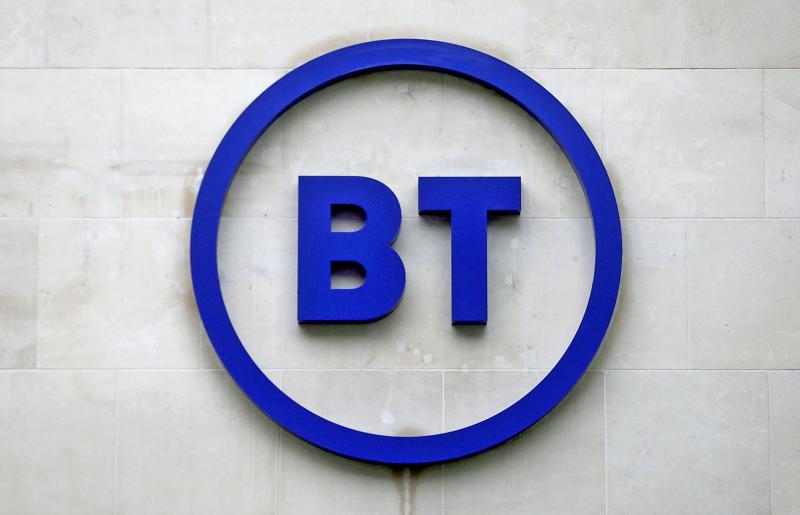Britain’s biggest telecom BT Group PLC has suspended its dividend, one of the biggest on the London Stock Exchange, until the 2021-2022 fiscal year and pulled its financial outlook in response to the COVID-19 pandemic.
The company said that the cash saving would bolster it through the expected financial crash that would lead to lower revenue from sports customers, reduced business activity and more cautious spending by multinational customers.
On the same day that rivals Telefonica SA and Liberty Global PLC announced the merger of their British units to build a stronger challenger, BT also set out plans for a new five-year program to modernize the business.

Photo: Reuters
The new program would cost £1.3 billion (US$1.61 billion) to achieve and would deliver annualized gross benefits of £2 billion by March 2025 as it switches off many legacy programs and uses new technologies to improve.
“Of course, COVID-19 is affecting our business, but the full impact will only become clearer as the economic consequences unfold over the next 12 months,” CEO Philip Jansen said. “Due to COVID-19, BT is not providing guidance for 2020-2021 at this time.”
It said it expected to resume dividend payments at £0.077 per share. In the 2018-2019 fiscal period it paid a full-year dividend of £0.154.
Jansen has been tasked with building nationwide gigabit fixed and mobile networks, while trying to shore up revenue and earnings in the short term.
The company yesterday said that it was working to build its fiber to the home network to 20 million premises by mid to late this year, on the assumption that it secures the right regulatory approval.
It said its 2019-2020 fiscal year results were in line with expectations.
In other news, Telefonica and Liberty Global yesterday announced that their British units — Internet supplier Virgin Media Inc and mobile phone carrier O2 — plan to merge and create a big new telecom provider in the UK.
The parent companies valued the new company at £31 billion.
Telefonica CEO Jose Maria Alvarez-Pallete said that “combining O2’s No. 1 mobile business with Virgin Media’s superfast broadband network and entertainment services will be a game-changer in the UK.”
O2 is the UK’s largest mobile phone company with about 34 million users. Virgin has more than 5 million subscribers to its broadband and cable television services.
Additional reporting by AP

EARLY TALKS: Measures under consideration include convincing allies to match US curbs, further restricting exports of AI chips or GPUs, and blocking Chinese investments US President Donald Trump’s administration is sketching out tougher versions of US semiconductor curbs and pressuring key allies to escalate their restrictions on China’s chip industry, an early indication the new US president plans to expand efforts that began under former US president Joe Biden to limit Beijing’s technological prowess. Trump officials recently met with their Japanese and Dutch counterparts about restricting Tokyo Electron Ltd and ASML Holding NV engineers from maintaining semiconductor gear in China, people familiar with the matter said. The aim, which was also a priority for Biden, is to see key allies match China curbs the US

The popular Taiwan Semiconductor Manufacturing Co (TSMC, 台積電) arbitrage trade might soon see a change in dynamics that could affect the trading of the US listing versus the local one. And for anyone who wants to monetize the elevated premium, Goldman Sachs Group Inc highlights potential trades. A note from the bank’s sales desk published on Friday said that demand for TSMC’s Taipei-traded stock could rise as Taiwan’s regulator is considering an amendment to local exchange-traded funds’ (ETFs) ownership. The changes, which could come in the first half of this year, could push up the current 30 percent single-stock weight limit

PROTECTION: The investigation, which takes aim at exporters such as Canada, Germany and Brazil, came days after Trump unveiled tariff hikes on steel and aluminum products US President Donald Trump on Saturday ordered a probe into potential tariffs on lumber imports — a move threatening to stoke trade tensions — while also pushing for a domestic supply boost. Trump signed an executive order instructing US Secretary of Commerce Howard Lutnick to begin an investigation “to determine the effects on the national security of imports of timber, lumber and their derivative products.” The study might result in new tariffs being imposed, which would pile on top of existing levies. The investigation takes aim at exporters like Canada, Germany and Brazil, with White House officials earlier accusing these economies of

Teleperformance SE, the largest call-center operator in the world, is rolling out an artificial intelligence (AI) system that softens English-speaking Indian workers’ accents in real time in a move the company claims would make them more understandable. The technology, called accent translation, coupled with background noise cancelation, is being deployed in call centers in India, where workers provide customer support to some of Teleperformance’s international clients. The company provides outsourced customer support and content moderation to global companies including Apple Inc, ByteDance Ltd’s (字節跳動) TikTok and Samsung Electronics Co Ltd. “When you have an Indian agent on the line, sometimes it’s hard